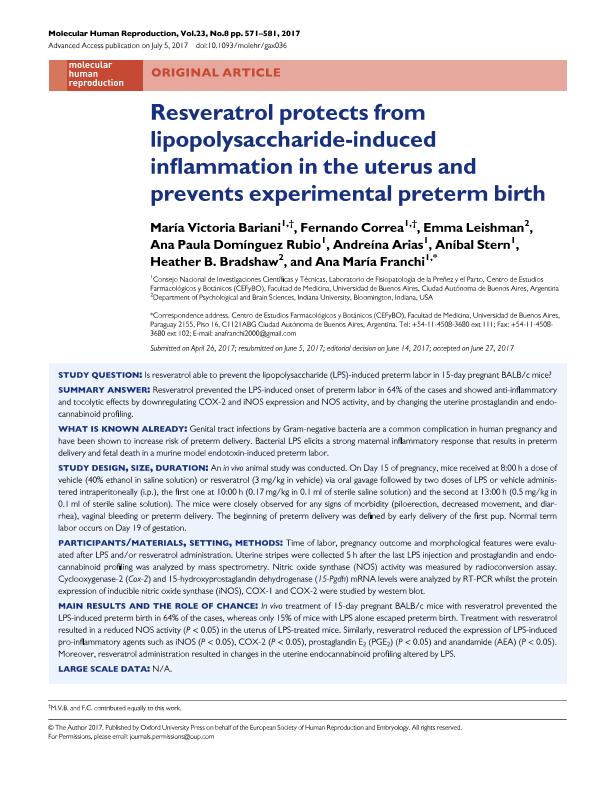Mostrar el registro sencillo del ítem
dc.contributor.author
Bariani, Maria Victoria

dc.contributor.author
Correa, Fernando Gabriel

dc.contributor.author
Leishman, Emma
dc.contributor.author
Domínguez Rubio, Ana Paula

dc.contributor.author
Arias, Andreina

dc.contributor.author
Stern, Anibal
dc.contributor.author
Bradshaw, Heather B.
dc.contributor.author
Franchi, Ana Maria

dc.date.available
2018-12-14T17:37:39Z
dc.date.issued
2017-07
dc.identifier.citation
Bariani, Maria Victoria; Correa, Fernando Gabriel; Leishman, Emma; Domínguez Rubio, Ana Paula; Arias, Andreina; et al.; Resveratrol protects from lipopolysaccharide-induced inflammation in the uterus and prevents experimental preterm birth; Oxford University Press; Molecular Human Reproduction; 23; 8; 7-2017; 571-581
dc.identifier.issn
1360-9947
dc.identifier.uri
http://hdl.handle.net/11336/66507
dc.description.abstract
STUDY QUESTION: Is resveratrol able to prevent the lipopolysaccharide (LPS)-induced preterm labor in 15-day pregnant BALB/c mice? SUMMARY ANSWER: Resveratrol prevented the LPS-induced onset of preterm labor in 64% of the cases and showed anti-inflammatory and tocolytic effects by downregulating COX-2 and iNOS expression and NOS activity, and by changing the uterine prostaglandin and endocannabinoid profiling. WHAT IS KNOWN ALREADY: Genital tract infections by Gram-negative bacteria are a common complication in human pregnancy and have been shown to increase risk of preterm delivery. Bacterial LPS elicits a strong maternal inflammatory response that results in preterm delivery and fetal death in a murine model endotoxin-induced preterm labor. STUDY DESIGN, SIZE, DURATION: An in vivo animal study was conducted. On Day 15 of pregnancy, mice received at 8:00 h a dose of vehicle (40% ethanol in saline solution) or resveratrol (3 mg/kg in vehicle) via oral gavage followed by two doses of LPS or vehicle administered intraperitoneally (i.p.), the first one at 10:00 h (0.17 mg/kg in 0.1 ml of sterile saline solution) and the second at 13:00 h (0.5 mg/kg in 0.1 ml of sterile saline solution). The mice were closely observed for any signs of morbidity (piloerection, decreased movement, and diarrhea), vaginal bleeding or preterm delivery. The beginning of preterm delivery was defined by early delivery of the first pup. Normal term labor occurs on Day 19 of gestation. PARTICIPANTS/MATERIALS, SETTING, METHODS: Time of labor, pregnancy outcome and morphological features were evaluated after LPS and/or resveratrol administration. Uterine stripes were collected 5 h after the last LPS injection and prostaglandin and endocannabinoid profiling was analyzed by mass spectrometry. Nitric oxide synthase (NOS) activity was measured by radioconversion assay. Cyclooxygenase-2 (Cox-2) and 15-hydroxyprostaglandin dehydrogenase (15-Pgdh) mRNA levels were analyzed by RT-PCR whilst the protein expression of inducible nitric oxide synthase (iNOS), COX-1 and COX-2 were studied by western blot. MAIN RESULTS AND THE ROLE OF CHANCE: In vivo treatment of 15-day pregnant BALB/c mice with resveratrol prevented the LPS-induced preterm birth in 64% of the cases, whereas only 15% of mice with LPS alone escaped preterm birth. Treatment with resveratrol resulted in a reduced NOS activity (P < 0.05) in the uterus of LPS-treated mice. Similarly, resveratrol reduced the expression of LPS-induced pro-inflammatory agents such as iNOS (P < 0.05), COX-2 (P < 0.05), prostaglandin E2 (PGE2) (P < 0.05) and anandamide (AEA) (P < 0.05). Moreover, resveratrol administration resulted in changes in the uterine endocannabinoid profiling altered by LPS. LARGE SCALE DATA: N/A. LIMITATIONS, REASONS FOR CAUTION: Since our experimental design involves the use of mice, the extrapolation of the results presented here to humans is limited. WIDER IMPLICATIONS OF THE FINDINGS: Our findings provide evidence for the tocolytic effects of resveratrol. STUDY FUNDING AND COMPETING INTEREST(S): Dr Ana María Franchi was funded by Agencia Nacional para la Promoción Científica y Tecnológica (PICT 2013/0097) and by Consejo Nacional de Investigaciones Científicas y Técnicas (PIP 2012/0061). Dr Heather B. Bradshaw was funded by NIH (DA006668). The authors have no competing interests.
dc.format
application/pdf
dc.language.iso
eng
dc.publisher
Oxford University Press

dc.rights
info:eu-repo/semantics/openAccess
dc.rights.uri
https://creativecommons.org/licenses/by-nc-sa/2.5/ar/
dc.subject
Endocannabinoid System
dc.subject
Lipidomics
dc.subject
Preterm Labor
dc.subject
Prostaglandin
dc.subject
Resveratrol
dc.title
Resveratrol protects from lipopolysaccharide-induced inflammation in the uterus and prevents experimental preterm birth
dc.type
info:eu-repo/semantics/article
dc.type
info:ar-repo/semantics/artículo
dc.type
info:eu-repo/semantics/publishedVersion
dc.date.updated
2018-10-23T19:44:30Z
dc.journal.volume
23
dc.journal.number
8
dc.journal.pagination
571-581
dc.journal.pais
Reino Unido

dc.journal.ciudad
Oxford
dc.description.fil
Fil: Bariani, Maria Victoria. Consejo Nacional de Investigaciones Científicas y Técnicas. Oficina de Coordinación Administrativa Houssay. Centro de Estudios Farmacológicos y Botánicos. Universidad de Buenos Aires. Facultad de Medicina. Centro de Estudios Farmacológicos y Botánicos; Argentina
dc.description.fil
Fil: Correa, Fernando Gabriel. Consejo Nacional de Investigaciones Científicas y Técnicas. Oficina de Coordinación Administrativa Houssay. Centro de Estudios Farmacológicos y Botánicos. Universidad de Buenos Aires. Facultad de Medicina. Centro de Estudios Farmacológicos y Botánicos; Argentina
dc.description.fil
Fil: Leishman, Emma. Indiana University; Estados Unidos
dc.description.fil
Fil: Domínguez Rubio, Ana Paula. Consejo Nacional de Investigaciones Científicas y Técnicas. Oficina de Coordinación Administrativa Houssay. Centro de Estudios Farmacológicos y Botánicos. Universidad de Buenos Aires. Facultad de Medicina. Centro de Estudios Farmacológicos y Botánicos; Argentina
dc.description.fil
Fil: Arias, Andreina. Consejo Nacional de Investigaciones Científicas y Técnicas. Oficina de Coordinación Administrativa Houssay. Centro de Estudios Farmacológicos y Botánicos. Universidad de Buenos Aires. Facultad de Medicina. Centro de Estudios Farmacológicos y Botánicos; Argentina
dc.description.fil
Fil: Stern, Anibal. Consejo Nacional de Investigaciones Científicas y Técnicas. Oficina de Coordinación Administrativa Houssay. Centro de Estudios Farmacológicos y Botánicos. Universidad de Buenos Aires. Facultad de Medicina. Centro de Estudios Farmacológicos y Botánicos; Argentina
dc.description.fil
Fil: Bradshaw, Heather B.. Indiana University; Estados Unidos
dc.description.fil
Fil: Franchi, Ana Maria. Consejo Nacional de Investigaciones Científicas y Técnicas. Oficina de Coordinación Administrativa Houssay. Centro de Estudios Farmacológicos y Botánicos. Universidad de Buenos Aires. Facultad de Medicina. Centro de Estudios Farmacológicos y Botánicos; Argentina
dc.journal.title
Molecular Human Reproduction

dc.relation.alternativeid
info:eu-repo/semantics/altIdentifier/doi/https://dx.doi.org/10.1093/molehr/gax036
dc.relation.alternativeid
info:eu-repo/semantics/altIdentifier/url/https://academic.oup.com/molehr/article/23/8/571/3914702
Archivos asociados
